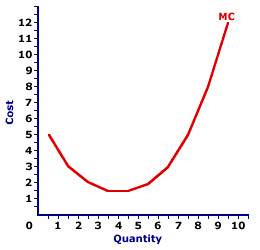
|
|
THE GENERAL THEORY: The common name for the book, The General Theory of Employment, Interest, and Money, by John Maynard Keynes. This work laid the theoretical foundations for the modern study of macroeconomics and the specific analysis that has come to be known as Keynesian economics. Published in 1936 during the depths of the Great Depression, The General Theory provided both a theoretical explanation for the cause of the depression and recommendations for policies to correct the problems. It was THE textbook for the serious study of macroeconomics for almost four decades.
Visit the GLOSS*arama
|
|


|

|
                           MARGINAL COST CURVE: A curve that graphically represents the relation between the marginal cost incurred by a firm in the short-run product of a good or service and the quantity of output produced. This curve is constructed to capture the relation between marginal cost and the level of output, holding other variables like technology and resource prices constant. Three related curves are average total cost curve, average variable cost curve, and average fixed cost curve. The marginal cost curve, the graphical relation between marginal cost and output, is U-shaped. Marginal cost is relatively high at small quantities of output, then as production increases, it declines, reaches a minimum value, then rises once again.This U shape is directly attributable to increasing, then decreasing marginal returns (and the law of diminishing marginal returns). As marginal product (and marginal returns) increases for relatively small output quantities, marginal cost declines. Then as marginal product (and marginal returns) decreases with the law of diminishing marginal returns for relatively large output quantities, marginal cost increases. | Marginal Cost Curve |  |
The graph presented at the right is the marginal cost curve for the short-run production of Wacky Willy Stuffed Amigos (those cute and cuddly scorpions and turtles). The quantity of Stuffed Amigos production, measured on the horizontal axis, ranges from 0 to 10 and the marginal cost incurred in the production of Stuffed Amigos, measured on the vertical axis, starts at $5, declines to $1.50, then rises again to $12.The marginal cost curve is U-shaped. For the first 4 Stuffed Amigos, marginal cost declines from $5 to a low of $1.50. However, for the production beyond 6 Stuffed Amigos, marginal cost increases. The source of this U-shaped marginal cost curve rests with increasing and decreasing marginal returns. In fact, the negatively-sloping portion of the marginal cost curve coincides exactly with increasing marginal returns in production Stage I. The positively-sloping portion of the marginal cost curve coincides exactly with decreasing marginal returns in production Stage II. The marginal cost curve takes center stage in the analysis of a firm's short-run production. In particular, a profit-maximizing firm equates the marginal revenue received from selling a good with the marginal cost of producing it. For a firm operating under perfect competition, its marginal cost curve becomes its supply curve. The marginal cost curve, because it measures the incremental opportunity cost of producing one more unit of a good plays, an important role in analyzing the efficient allocation of resources.

Recommended Citation:MARGINAL COST CURVE, AmosWEB Encyclonomic WEB*pedia, http://www.AmosWEB.com, AmosWEB LLC, 2000-2025. [Accessed: July 3, 2025].
Check Out These Related Terms... | | | | | | | | | | | | | | | | | |
Or For A Little Background... | | | | | | | | | | | | |
And For Further Study... | | | | | | | | | | | | | | | |
Search Again?
Back to the WEB*pedia
|



|

|
BROWN PRAGMATOX
[What's This?]
Today, you are likely to spend a great deal of time at a flea market hoping to buy either a coffee cup commemorating the 2000 Olympics or a birthday gift for your grandmother. Be on the lookout for crowded shopping malls.
Your Complete Scope
This isn't me! What am I?
|

|
|
A U.S. dime has 118 groves around its edge, one fewer than a U.S. quarter.
|

|
|
"Far and away the best prize that life has to offer is the chance to work hard at work worth doing." -- Theodore Roosevelt, 26th US president
|

|
JHR
Journal of Human Resources
|

|
|
Tell us what you think about AmosWEB. Like what you see? Have suggestions for improvements? Let us know. Click the User Feedback link.
User Feedback
|


|


